-
Syria military launches Scud missiles at rebels
Facing growing political isolation, deteriorating economic conditions, and military setbacks, the Assad regime is escalating the level of violence in its war against the opposition; the three latest weapons the regime used in its effort to hold off the rebels: Scud missiles, cluster bombs, and incendiary munitions; yesterday, Pakistan became the 69th country to close its embassy in Damascus
-
-
A new tool supports humanitarian demining
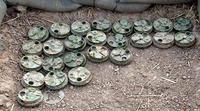
Landmines and other abandoned explosive ordnance are part of sad legacy of many conflicts; these devices can remain active during decades threating humans in the affected areas and depriving them of their lands and resources; today, a huge part of these tasks of humanitarian demining are still conducted by using hand-held detectors, particularly, metal detectors, though other detectors are being introduced gradually
-
-
Terahertz waves for explosives detection
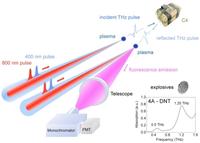
The chips generate and radiate high-frequency electromagnetic waves, called terahertz (THz) waves, which fall into a largely untapped region of the electromagnetic spectrum — between microwaves and far-infrared radiation — and which can penetrate a host of materials without the ionizing damage of X-rays; when incorporated into handheld devices, the new microchips could enable a broad range of applications in fields ranging from homeland security to wireless communications to health care, and even touchless gaming
-
-
Syrian rebels trained in handling, securing chemical weapons
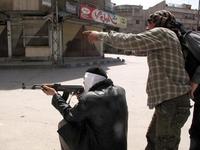
The United States and some of its European have issues contracts to defense contractors to train Syrian rebels on how to identify, handle, and secure chemical weapons stockpiles in Syria; some of the training is done in Jordan, but some of the contractors are already inside Syria, where they, and U.S. intelligence operatives, are working closely with friendly rebel groups to monitor Syria’s chemical weapons production and storage sites
-
-
Marine robot completes 9,000 mile cross-Pacific journey, setting new world record
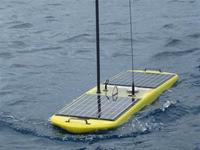
A wave-powered robot completes a 9,000 nautical mile (16,668 kilometers) scientific journey across the Pacific Ocean to set a new world record for the longest distance traveled by an autonomous vehicle
-
-
Revamped DARPA inventor mentorship programs increases funding
DARPA says it wants to ensure that young scientists with novel ideas which may advance U.S. national security receive the funding and mentorship needed to investigate them; as the DARPA Young Faculty Award (YFA) program enters its seventh year, changes in scope mean that 2013 recipients can expect higher levels of funding — up to $1 million available for elite young researchers — for a potentially longer duration in a program that has been reworked to involve even more direct interaction with DARPA program managers
-
-
IAEA: Iran finished removing evidence of illicit nuclear work at Parchin
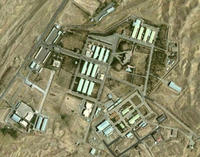
Iran, implausibly, may explain away its uranium enrichment activities by saying it needs the enriched material for civilian reactors and medical research (although the sheer quantities of uranium it enriches bear no relationship to either need); warhead design is done by a few engineers at secret locations; there is one activity – testing of the triggering mechanism for a nuclear bomb – that cannot be explained away (because these triggers do not have any other use) or hidden (because the testing leaves unmistakable traces); Iran has been conducting tests on a triggering mechanism for nuclear warheads at a military base called Parchin, south of Tehran, and has blocked access of UN inspectors to the site; detailed satellite imagery shows that Iran has been engaged in a frantic effort to scrub all evidence related to nuclear weapons testing activity at the military base by demolishing buildings and removing large quantities of soil that might hold traces of illicit nuclear work; the IAEA says that Iran has succeeded in its clean-up effort
-
-
Two small, long-endurance UAVs unveiled
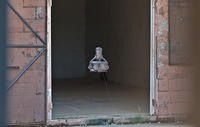
Danvers, Massachusetts-based CyPhy Works, a new robotics company, the other day unveiled two revolutionary small unmanned air vehicles (UAVs): EASE and PARC; the Extreme Access System for Entry (EASE) is an indoor flying UAV to help police, soldiers, and inspectors remain at safe standoff distances; the Persistent Aerial Reconnaissance and Communications (PARC) is designed to fly vertically and remain hovering for unprecedented long durations without operator intervention
-
-
Syria arms dozens of chemical aerial bombs
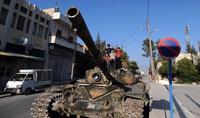
President Assad has taken the last step required for using chemical weapons: over the weekend the Syrian military begun to move chemical weapons from their storage areas to military bases where the delivery vehicles of these weapons – planes, tanks, and artillery – are stationed; on Tuesday and Wednesday the Syrian military has taken the second step required before chemical weapon deployment: its engineers have begun to mix the chemicals of these binary weapons, making them operational; the bombs have been placed in hangars next to the planes which will carry them to target – and it would now be a matter of minutes from Assad ordering the use of these weapons to planes dropping them on their targets
-
-
Israel to test advanced Arrow 3 anti-missile missile
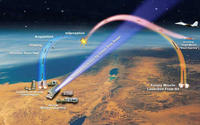
The official in charge of developing Israel’s missile defense system said yesterday that in the coming days Israel would conduct a test of the advanced Arrow 3 missile; the Arrow 3 has been developed to shoot down Iranian ballistic missiles on their way to Israel; the Arrow 3 has been designed to intercept missiles carrying nuclear warheads – and intercept them outside the atmosphere
-
-
U.S. denies Iran’s claim that it had captured a U.S. surveillance drone
Drones are used extensively by the United States to monitor not only Iran’s nuclear activities, but also its military moves on land and at sea. Iran’s state television reported on Tuesday that Iran’s Revolutionary Guards Corps naval forces captured an American drone that entered Iranian airspace over the Persian Gulf. The U.S. Navy quickly denied the claim
-
-
The Assad regime moving chemical weapons closer to delivery vehicles
Over the weekend, the besieged Assad regime has begun to move chemical munitions out of storage to military bases where the delivery vehicles for these weapons are based; the move of these munitions was captured by U.S. and Israeli intelligence assets, and confirmed by human sources inside the regime; the readiness of the regime to place chemical warheads right next to the weapons – missiles, planes, tanks, and artillery – which will deliver them has dramatically increased the sense of alarm in the region, in Europe, and in Washington
-
-
Squirrels-inspired deceptive robots to help the military

Using deceptive behavioral patterns of squirrels and birds, researchers have developed robots that are able to deceive each other; the applications could be implemented by the military in the future
-
-
Marines looking for solar energy in combat outposts
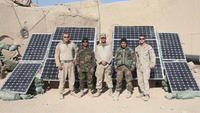
The Office of Naval Research (ONR) is looking to the sun for energy in an effort to help Marines do away with diesel-guzzling generators now used in combat outposts; the Renewable Sustainable Expeditionary Power (RSEP) program seeks to create a transportable renewable hybrid system that can provide Marines with electricity for a 15-day mission without relying on fuel resupply convoys that often become targets for adversaries
-
-
Fabric for military uniforms to repel chemical and biological agents
Military uniforms of the future may offer a new layer of critical protection to wearers; the fabric will be able to switch reversibly from a highly breathable state to a protective one in response to the presence of the environmental threat without the need for an external control system; in the protective state, the uniform material will block the chemical threat while maintaining a good breathability level
-
More headlines
The long view
Bookshelf: Smartphones Shape War in Hyperconnected World
The smartphone is helping to shape the conduct and representation of contemporary war. A new book argues that as an operative device, the smartphone is now “being used as a central weapon of war.”
